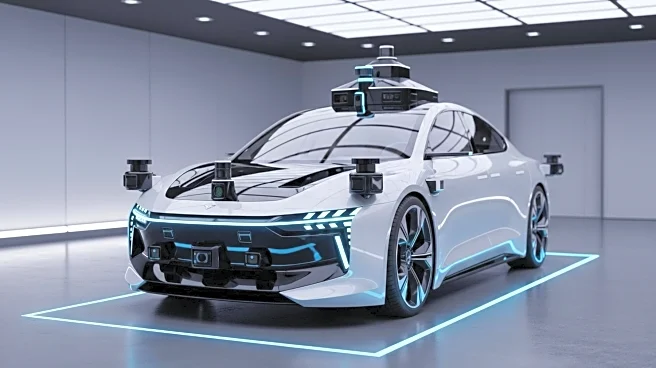What is the story about?
What's Happening?
Tesla, led by CEO Elon Musk, is advancing its self-driving car technology using cameras and neural networks, foregoing the use of LIDAR. This decision has sparked debate among investors about the feasibility of achieving scalable autonomy without LIDAR, a sensor system that creates 3D maps using lasers. Tesla's strategy is to leverage its existing vision system for its autonomous ride-hailing network, Robotaxi. Despite recent financial pressures, including a 42% drop in operating income in the second quarter of 2025, Tesla's stock has rebounded as investors focus on its AI and autonomy ambitions.
Why It's Important?
Tesla's decision to pursue a vision-only approach to autonomy is significant as it could redefine the economics of self-driving technology. By avoiding LIDAR, Tesla aims to reduce hardware costs and increase margins through software revenue, such as Full Self-Driving subscriptions. This approach aligns with how humans drive, using eyes and neural networks, but must prove effective across various driving conditions. Success in this area could transform Tesla from a traditional automaker to a software-driven business, impacting its long-term earnings potential and market valuation.
What's Next?
Tesla investors should monitor several key areas in the coming quarters, including software adoption rates, energy storage scaling, and operating margins. The success of Tesla's Robotaxi initiative hinges on achieving safe, scalable autonomy with regulatory approval. If Tesla can demonstrate the effectiveness of its vision-only system, it could lead to faster deployment and improved unit economics. However, failure to meet safety standards could challenge Tesla's growth prospects and its current market valuation.
Beyond the Headlines
Tesla's approach raises broader questions about the future of autonomous driving technology and its regulatory landscape. The reliance on vision-only systems may prompt discussions on safety standards and the role of AI in transportation. Additionally, Tesla's strategy could influence other automakers and tech companies in their pursuit of self-driving technology, potentially leading to shifts in industry practices and consumer expectations.
















